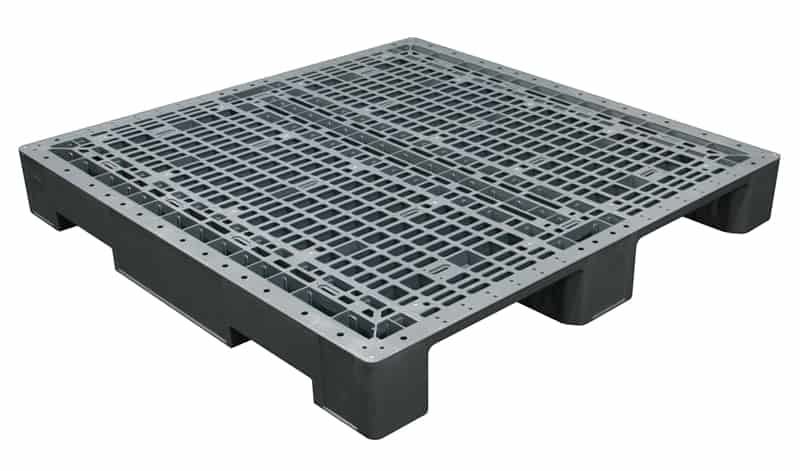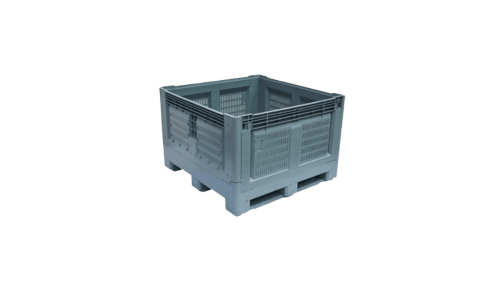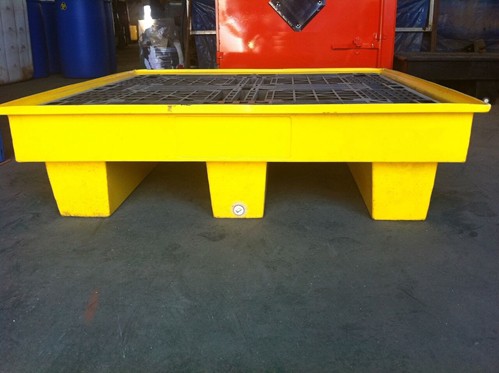

The plastic pallet lifespan is a large part of why these have become an increasingly popular choice for maximising shipping operations. As a hygienic, easy-to-clean and lightweight alternative to wood pallets, they are particularly in demand across the pharmaceutical and automotive industries.
Despite the numerous advantages of plastic pallets, many operations and logistics managers are cautious of the high initial cost – which can be up to three times that of wood pallets. Those in charge of supply chains are well aware that the plastic pallet has a much longer working life than the wooden alternative. However, many are lacking the details to understand how cost-effective the purchasing decision will be in the long run.
Plastic Pallet Lifespan Is 10X Longer Than Wood
For a variety of reasons based on their plastic material type, plastic pallets have a working life of up to and exceeding 10 times that of wooden pallets.
Heat-moulded plastic pallets retain their strength and structure over a 10-year lifespan. Realistically, this means that plastic pallets are usable for upwards of 10 years.
“Plastic pallets are utilized for multiple trips without being disposed of after single-use, eliminating packaging waste going into landfills and making them highly sustainable, even though they are made from non-biodegradable material. Growing government focus on reusing and recycling packaging products coupled with increasing sustainability awareness among the consumers is expected to favor market growth.“
– Grand View Research Market Analysis Report
The Global Plastic Pallets market report estimates that plastic pallets are 42 per cent more durable than wood, which along with lowered load weight, reduces overall costs by around 50 per cent.


4 Reasons Why Plastic Pallets Last So Long
1. Impervious to moisture
Even under the most extreme conditions, plastic pallets are moisture-resistant. Unlike their wooden counterparts, they do not absorb fluid, making them immune to warping and enabling them to retain their tactile strength over time.
Additionally, pallets made with polyethylene and polypropylene are impervious to a number of commonly occurring alkalis and acids, further reducing the likelihood of exposure damage.
2. Safe handling
The most common reason for pallet disposal is the risk of injury to workers and products. Older wooden pallets are notorious for splintering and protruding nails, both of which pose hazards to workers handling pallets and also the surrounding products. By contrast, plastic pallets cannot splinter and their heat-moulded smooth edges are designed to prevent damage to people and products they come into contact with.
3. Hygienic and cleanable
The smooth and heat-sealed surfaces of plastic pallets make it impossible for bacteria to grow within or on the surface of the pallet. Dust and mould are similarly unable to take hold regardless of how humid or moist the environment in which they are kept. Cleaning plastic pallets is also a more straightforward and simple process by using steam or other low-cost methods. No matter how high the hygiene standards of the product are, plastic pallets can be used repeatedly with no sanitation concerns. This goes for both hygiene pallets and your standard export, reversible and non-reversible plastic pallets.
4. No shipping regulations
Due to their structural integrity and waterproof coating, plastic pallets have no shipping regulations. Unlike wooden pallets which have the potential to carry invasive insect or plant diseases. And therefore having to undergo fumigation treatments to pass shipping standards, plastic pallets suffer no such schedule interruptions. This means it is never more time effective to buy new plastic pallets as can be the case with wood pallets on tight shipping schedules.
How Long Pallets Last Summary
A long plastic pallet lifespan is based on the fact that plastic pallets are 42 per cent more durable than wood which along with reduced load weight reduces overall costs by around 50 per cent.
In summary, plastic pallets and their strength can last a decade or more if properly maintained. That is 10x longer than wooden pallets. In terms of long-term investment, they offer great value for money.
Thanks for coming by Eco Pallets Australia.
If you are interested in how long-life plastic pallets can reduce your supply chain costs contact the Eco Pallets team today.









Comments are closed.